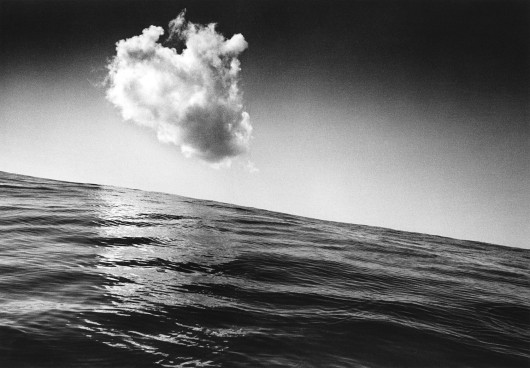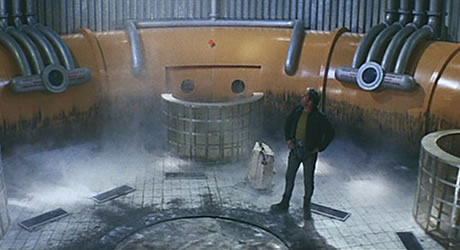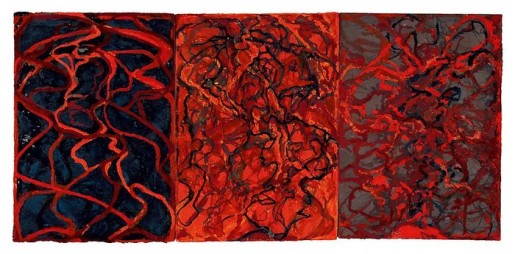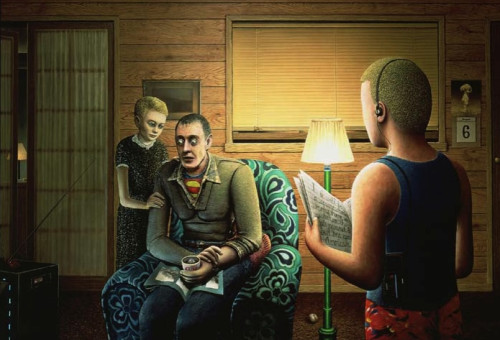
Shomei Tomatsu
One thing is becoming increasingly clear; the infantilization of society. It is obvious in almost every area of life today. But, there are secondary, or parallel themes attached to this encouragement to stay childish.
One is the creation of constant needs. As Jonathan Crary says, the term “24/7” is one without real meaning, except to suggest a “ceaslessness of needs and their incitement, but also their perpetual non-fulfillment”. What is worth looking at, and Crary makes this point, too, is that today people in the West sleep about, on average, six and a half hours a night. A generation ago it was eight. And at the turn of the 20th century, it was ten. The pre industrial revolution saw sleep more directly linked to the rhythms of agriculture and hence to seasons and to weather.
There are differing theories though, about earlier sleep patterns: http://www.bbc.co.uk/news/magazine-16964783

Solaris, 1972, Dr., Andrei Tarkovsky
Still, toil and labor have always mediated how people sleep and rest. The point here (because Im not really writing a post on sleep) is that today, the colonizing of consciousness is making inroads into the realm of sleep. And the control of daily life now includes the control of, or partly, that of sleep. The creation of artifical anticipation connects to, and is manufactured through the ‘need’ to check your messages or emails. But that is the result of the selling of the idea of urgency to these communications. But the communications themselves are abridged and limited and usually superficial. The desire to shop for lifestyles, to modify your personal brand, is linked in all this to the idea of both progress and modernization, and to reducing the non productive dimension of sleep.
In the attention economy, work and leisure are merging. The definition and value of living labor is, maybe, more elastic. People work longer, and their social protections are meanwhile being stripped away. Now, the idea of insomnia has launched quite a lot of theorizing. Its a popular topic, it seems. The one place where I disagree with Crary, is that he sees the 24/7 world (his term) as disenchanted. I suspect this is true for a lot of people, but its also not true for a significant number. The sense of a world “identical to itself” is correct, but there is lurking, within the encroaching technologies and electronic realities, a sort of new enchantment. Now, Crary does in fact, counter himself, and anticpates my argument when he talks of Tarkovsky’s Solaris. Now, in the comments thread of the previous post, a discussion arose around the new Cuaron film, “Gravity”. A film embraced as a masterpiece by mainstream critics, and by pseudo leftist crypto reactionaries over at Jacobin. And I mention this, not just because I so dislike the willfull ignorance of Eileen Jones, but also because the Cuaron film is a perfect exhibit to place alongside the Tarkovsky, and in line with Jonathan Crary’s extended essay, “24/7”. But back to the Tarkovsky for a moment. The film, Solaris, was made as a response to Kubrick’s 2001; Space Oddyssy. It was a filmic meditation on the idea of progress, of hubris, and of disenchantment, though, also of re-enchantment.

Paul Graham
Tarkovsky said in an interview:
“Solaris had been about people lost in the Cosmos and obliged, whether they liked it or not, to acquire and master one more piece of knowledge, given him gratuitously, is a source of great tension, for it brings with it constant anxiety, hardship, grief and disappointment, as the final truth can never be known. Moreover, man has been given a conscience which means that he is tormented when his actions infringe the moral law, and in that sense even conscience involves an element of tragedy.”
Sleep deprivation in space, and the incorporation of dream activity into daily life, is part of the thematic fabric of Solaris, and this destruction of dream space is one of the trends in advanced captial… but with different focus. Tanizaki, in his book on aesthetics, In Praise of Shadows, speaks directly to the over illuminated West. For in Japanese architecture, the shadow is a design element. Knowing the texture of shadow is as important as knowing the illuminated wall the shadow is cast upon. In the Tarkovsky, technology is seen as part of a spiritual bankruptcy, an extension in the belief in phantom progress. The entire idea of space travel, of “out” into infinity is interrogated by Tarkovsky. The futuristic car ride to nowhere (in Solaris). Nowhere fast. And that our desires are shaped as much by dreams as by waking life. Our lust as well, and that love is a mediated construction. The space station in the Tarkovsky connects, on a spiritual level, to the castle in Hamlet. The dark of space is the dark of the storms in Shakespeare (per Ted Hughes) and the blackness of painters such as Motherwell and Rothko. The void is not empty. Emptiness is not nothing. Speaking of nothing, you will find nothing, NOTHING of any of this in the Cuaron film. So, what accounts for the glowing rave reviews of this crap? I think this takes us back to Capitalism itself.

Olafur Eliasson
This also connects to the Girardian idea about scapegoating (per the previous posting and comments thread) and to hyperreality. To simulacra. For all of this is hard to de-link from this illusion of customized self brand creation. The desire of the other’s desire. We all sort of want the same thing, and we all become alike.
The protagonist’s father in the Tarkovsky says to his son, “space is too fragile for your kind”. This is because for Tarkovsky, the infinity of space is the infinity of inner space. One of the grave failings of the Cuaron film is the pedestrian marketed idea of realism that permeates the film. The lack of questioning is conspicuous by its absence. This is Capitalism’s ‘outer space’. I have always found the Tarkovsky film a lot like the films of Mizoguchi. The mystical cannot be extracted from the texture and emotional architecture of the film. If Star Wars was a space western (and a bad one) then Tarkovsky’s Solaris is a Mizoguchi or Bergman in space.

Ugetsu, 1953, dr. Kenji Mizoguchi
Horkheimer said (or Lowenthal, its debated) that the culture industry was like psychoanalysis in reverse. Debord said, and Crary quotes him, that the “spectacle expresses nothing more than societies wish for sleep.” But in a sense, its not sleep the Spectacle wants, it’s a waking sleep. The sonambulist as perfect consumer, or soldier or cop. Crary also mentions the Nazi party slogan “Germany awake!” Since I believe a good part of what art is meant to do, or what it plays a role in, is awakening, I suspect that one had better define what is meant by awakening. Crary points out that in a global capitalist system, that runs twenty four hours a day, the metaphor of awakening is compromised in a sense. To keep people from sleeping (from dreaming) is an efficient way to prevent awakening. If by awakening one means an epiphanic moment, a satori. The spectacle promotes trance. A reflexive unthinking obedience to commands. The rise of the command culture seems pretty obvious. It can be seen constantly in Hollywood film and TV. It it noticable in print media as well; where headlines are written as orders. The advanced west feels increasingly inhabited by people hypnotized by an evil Mabuse figure.
The manufacture of anxiety is part of the colonizing of consciousness, and specifically, of dreaming. The creation of false urgency is connected to the creation of false tension in narratives. Films such as “Gravity”, in exactly the same fashion as the Bourne or Mission Impossible franchises, or countless TV cops shows, are all predicated on artifical tension. The viewer knows the drill. Sandra Bullock is a “star” so the audience knows she won’t die until the end, if she dies at all. There is no suspense. There is only the pretense, the well known cliche of structural suspense. The audience knows how to read this narrative. They have been trained for decades. In fact, sleep is now stigmatized. Plots revolve around those appointed to ‘watch’, and who fall asleep on their job. Lack of attention to the job. The paradox is obvious, here. Attention is only good if it is serving capital or the authority structure. The sensual sleep of the erotic is reserved for those with the acceptable luxury of time. This is also connected to instrumental logic at its core. Watching means watching screens, usually. Listening means listening to technological speakers, to sound systems, to head phones. But only those whose information comes from authority. Listening feels more and more to be a listening to recorded speech.
“…the potential menace to the peaceful sleep of the ownership class comes from the poor and indigent…”
Jonathan Crary

Paula Rego
Today, the erasure of space is linked to the constant hum of data information, of social networking, and of the compulsive repetition of the same. There is no space for accumulation in narrative. Emotional or intellectual accumulation is destroyed by the hyperbranded reality of the Spectacle. So, the poor are stigmatized for sleep. It is a sign of laziness and sloth. Of lassitude and torpor. The ideal citizen is one at work all the time. Industrious and attentive to the screen image or the sound of command. Diligence has come to mean a readiness to obey. A culture of shaming and reprimand is based on a model of reality in which there is no history to reflect upon. Today’s mass culture only reinforces this. The “real” is a never changing present. Plots revolve around the idea of disrupting this present, and then returning to this present. Actual tragedy, Chernobyl or Bhopal or Katrina are simply ignored in terms of their material consequences. What matters are events that disrupt the Empire’s carefully constructed present reality.
Today, the failure to adhere to the constant command to shop, or somehow to interact with screens and data (regardless of how pointless) means that most people feel a dread of failing to be diligent and ‘awake’. Awake in the 21st century actually means asleep.
The narrative sense of time, say, in 19th century novels, now seems quaint and distant. The way in which stories were told by travelers at the inn, or in relaxed conversation is archaic in feeling and not just situation. Today narratives must present a feeling of constant forward motion, the better to conceal their actual non movement. The destruction of traditional learning and community plays a role in this as well. Human relationships take place in the hyperreal time of social networking. Screen life is there to scold you for non participation. I suspect one of the appeals of narcotics today is that they obliterate instrumental time. Schools and prisons share the same erasing of time as the Casino. There are no clocks in casinos, and the lurid and busy designs of the carpeting is tested to make the customers stay awake. Awake but asleep. One is meant to think only of the present. And in the present one is meant to pay attention to the orders and commands, and to process data, not to think. The selling of a future is really the selling of a non changing present. Certainly not to reflect on the past. The modern surveillance state is another example of time and space being mediated and compromised. We are being watched, all the time. Wherever we are. Day and night. The world is giant prison, a giant Casino, with people watching that you don’t cheat or try to escape.

Ben Nicholson
Part of the electrically illuminated world is to make night a relative concept. Las Vegas is the template for ‘the city that never sleeps’. I have written about the way digital image has eroded vision. It has made space receed. Whether this has assaulted visual dominance or not is an open question, but it has certainly affected ‘how’ people see. But then the camera directs the viewer where to look. In theatre, this lack of a camera lens has always been a component of the inherently dissident quality of the stage. All the more reason that theatre has been increasingly marginalized. Now, when history is erased, I suspect we ‘see’ things differently. When the community is destroyed, there is no person in front of us with which to share our thoughts on what are we are both “seeing”. And of course, “hearing”. I have also spoken of text that defies this homogenizing of perception, and disrupts expectation. The elliptical and mysterious meance of a Pinter, feels ever more radical today. Even in Hollywood product, sometimes narrative can disrupt the assumptions of the manufactured real (Blue Caprice is an example). However, my sense is that there is now less ability to engage with these texts. Sartre wrote fifty years ago about how he could no longer really see news photos. How they all became the same image in a sense. And part of the kitsch aesthetic is the manufacture of the “weird” affect. From David Lynch to various sci fi directors, to countless indie films about non conformist characters, the “weird affect” is there to stop further exploration of text. Robert Wilson is an example of spectacle designed as ‘art’. And the creation of ‘the weird’ is just another way to mask the fact that the global security state is not a spontaneous reaction to spontaneous technological innovations, but is in fact the planned domination of the planet by the ruling elite…by global militarism and is the exact intended consequence of Imperialism. Control isn’t something natural. People do not suddenly think, oh, wireless telecom, lets shop. It is also worth remembering that many do not share in modern technologies, and are therefore stigmatized. Youth are the victims of this more than anyone else.
Marketing and advertising are in the business of preventing aesthetic discrimination. They replace reflection with the illusion of choice. Choice in shopping is equated with individuality and freedom. In the process, time and space recede a little further. Complex narrative is antithetical to shopping. Too much time is needed to read complex narrative. To even read a complex sentence. Nike has achived the ultimate, for the moment, with just a sign, the ‘swoosh’, which communicates its own simplistic narrative and command. Giant telecoms and corporations like Google and Verizon and Microsoft have now monopolized narrative much as they have monopolized or organized their consumer base. NSA is not much different in the sense that it simply tracks everything, and stores it for future use. And it really doesn’t matter if it’s ever used. The point is to create a model of society. Consumers willingly ask to be tracked. And they can hardly do otherwise. One cannot boycott any of this, it serves no real purpose, except to further marginalize one and make one even more vulnerable. The new disposible population, those most economically marginalized, across the planet, have to be dealt with. This is the embedded death wish of modern capital. Or the murder wish.
I said somewhere that schools were now laboritories of disposibility. The young are laboritory rats. Henry Giroux has cogently pointed out the state of education today.
http://www.truth-out.org/opinion/item/18133-when-schools-become-dead-zones-of-the-imagination-a-critical-pedagogy-manifesto

Las Vegas, 1942
Crary points out that the accelerated production of novelty gadgets is working to erase collective memory. Again, historical amnesia is the road to disappearing personal memory. In the advanced West, the management of one’s life resembles an economic model. Risk management. And today one’s life, in the West, is ever more filled with pointless but necessary bureaucratic tasks. Necessary for there are laws and economic penalities, but pointless because usually they are absolutely unecessary. Another aspect though, looms in all this. Anyone who has been in a power outage knows just how disruptive it is. You cant use credit cards, or computers, or banks and you cant even buy food. The mythology of modern technology hides an inherent fragility. And somewhere in our psyches we know this. So the dread surfaces in multiple ways. Technology is presented as perfect. That progress is visible. And this faith is now deeply engrained.
The homogenizing of screen experience, at the expense of real experience, has served to not just erode utopian dreaming, but it has cast a good deal of critical writing on all sides, politically, in the same tone. When leftist (sic) journals applaud Hollywood film junk, or curators market various novelities and ephemera, there is, in this society of consensus, an increasing consolidation of opinion and styles of expression. Language is stripped down to interchangable generalities, and spoken in the service of the latest cultural product…soon to be replaced with a yet newer model. Everything is transitory, but everything exists within an enclosed universe of sameness. A sameness of now. Of a manufactured “present”.

Gravity, 2013, Dr. Alfonso Cuaron
I wrote a couple postings back about the loss of creativity. And this links to the synchronized sense of taste, organized around corporate PR. It contains within it the tools of snark and cheap irony. And of consensus as a virtue. Dissent is actually now criminalized. But even creativity is suspect if it does not reproduce the same. Children are indoctrinated in consensus, via the instruction in consumer virtue and in the privileging of screen experience.
http://www.commondreams.org/further/2013/12/10-3
But I want to sort of bring this back to the question of sleep and awakening. And its impact on cultural forms. All narrative contains a liberating potential. But narrative is disappearing. Films such as “Gravity” serve as good examples. Once one looks a bit closer at such a film, one sees that in fact there really is what can barely be called a narrative, so adumbrated is the story. It is presented as if a narrative were there, but in fact what IS there are only signifiers for narrative. A prospectus for a narrative. If one were to compare this to, say, any film noir from the 1940s, or to novels from the first half of the 20th century, let alone the 19th, one can readily see the sense of time that is escaping. Less and less time is needed. One can read the Cuaron film as one reads an ad for laundry detergent. When what is being read are only a string of Nike swooshes, in effect, the experience is very narrowly controlled. Everyone is going to read the same thing. So, what accounts for some people thinking it’s a masterpiece, and others not? The answer is the way attention is conceptualized, and the degree of autonomy of different viewers. Total homogenization has not yet been reached. But it is this context, the organization of context, for, especially, an affluent class more inclined and more able to consume this stuff, that is being voiced in critical writing on culture. And here other questions intersect. For this context is effected by race and gender and class. And educational experience. All the many things that provide us with our opinions and our skills in interacting with narrative. And also, our desires. For some the desire is very strong to conform, even if that individual is conforming via a set of mental constructs that are the products of class and training. Not all people approach art and culture with the same desires. And here, I believe, is the place of great debate and discussion is needed.

Brice Marden
And in a sense, this is what this blog was meant to be. This is a society (the U.S.) that has over 2 million in jail. It is a society in which vast numbers of people take psychotropic drugs, anti depressants, and other pharmacological products, and it is a society of vast and growing inequality. So on the one hand, the system is failing badly, even by its own definitions. On the other hand, this is a society that, on its own terms, is solving the problems of poverty and unemployment by punishment, custody, and through brutal tactics of police domination. The homogenization of points of view is both true and false. What is true; without question however, is the growing inability of the populations of the West today to have learnt the skills of cultural discrimination. To have the learned abilities for both creative expression, and for the establishing of that space that provides for a mimetic engagement. The loss of community, of collective awareness, is the greatest harm in terms of culture. And the academic elite, the gatekeepers of taste, usually white and male and affulent.
*As a footnote to conformist taste. To follow any fanzine or, actually any print media, is run into lists that instruct the reader in what to like. Usually cancelled shows are described as bad. Shows that are picked up as good. And usually these are written well after sponsors make their decisions. You see it in marketing a lot: “suprise hit of the summer”….from an add in March.
It is really disturbing for example to see the effects of the crypto reactionary left press praise junk like “Gravity“. For this is not a question of subjective opinion, but of wholesale ignorance and a failure of memory. A failure of historical perspective.
But back to the question of homogenization of perception. I suspect the chemical warehousing of people, under cover of a corrupt psychiatric institution that invents new disorders every year, has resulted in creating similar states of passivity. This is a result, partly, of Freudian radicalism becoming American adjustment therapy. Russell Jacoby’s book Social Amnesia still remains the best overview of this phenomenon. So one has in a culture of therapy a pathologizing of the normal, and in the culture industry the normalizing of the pathological.
I suppose in a way, both are present in film and TV, actually. The normalizing of police state values is clear in the countless TV cop shows and super hero films, and the accompanying normalizing of violence from both military and police. But there is a more subtle pathologizing of everyday behavior, of the anger of discrimination, and of inequality. The depression and frustrations of poverty. A character is usually deemed unstable, or in need a therapist, if he or she expresses the normal feelings that come with lack of a job, with daily frustrations, or just normal mood swings. In other words, unless you are a Ken doll or Stepford wife, you are not well. And the general manufacturing of fear of everyday life. Movies manufacture fear, and then stigmatize those who become afraid. The result is either heavy does of anti depressants, or the hiding of feelings.

Battistello, Young Saint John in the Wilderness
The marginalized population hides their feelings more from self preservation. The more affulent are allowed snark, and irony, and tend toward, instinctively, the reinforcing of prevailing accepted values. The erasing of space and sleep, and the promotion of trance like obedience is the perfect outcome for the ownership class. The propriator class. Wealthy enclaves across the country, gated often, and most certainly privileged in educational opportunity, and free, largely, from police harrassment, exist in what are increasingly surreal personal spaces of hyper consumption. These are the establishment shopping experts who applaud the narrative commodities of the police state. The underclass, however, is susceptible to all the same influences, even if in less pronounced ways. The master narrative valorizes Jay Z, because he is rich. He is a genius. He is a shallow and venal man of pedestrian taste, but no matter. He is marketed. The breakdown among black and white around celebrity is a topic worth following up.
Adorno was no doubt correct in his suspicion of gesture, and of musical cadence that reproduced the industrial machine, the stiff and armored character (that Reich wrote about,too) and today the post industrial landscape has replaced the machine gesture with a Prozac flaccidness. In the last post I wrote about the unfinished narrative reflecting unfinished building and public works, and unfinished desire. But there is another aspect to this, and it is the discarded story. The discarded narrative, which mimics the disposible products, the junk of designed obsolescence, and disposible people. The discarded is not quite the same as unfinished. The discarded leaves no ruins. No trace residue. It is thrown out with the trash. It is a more nihilistic form of the unfinished. Most everyone has stories about their grandmother’s hair brush, or their grandfather’s boots, which are 130 years old. And some remember the early light bulbs that lasted four times what today’s bulbs last. There are narratives around these memories, designed to create forgetfullness. The light bulb companies invent stories of advancements, which are no such thing. Hair brushes are available now in 200 hundred colors, albiet lasting only three months. Such progress! And through this all is the new twenty four seven that Crary writes about. And which indeed is a valuable model for the elimination of mimesis. And I am certain toys will increasingly feature screen time marketed under cover of educational advancement. The consumer society is really now a control society. A society of obedience. Deterritorialized labor and an attention economy, have extended labor, unpaid labor, and soon sleep will be penetrated. Perhaps is already is. The biological effects of screen addictions isn’t known. The rise in autism, which I’ve touched on before, might have many reasons. What is less discussed is the trend in the non autistic populace to mimic autistic processing of image. And I suspect narrative. I suspect all human interelations now reflect something of an autistic quality. The struggle of those with autism is better understood now, but the imitatation of these conditions is worth pondering. The films of Hollywood and network TV are childish. The language of TV news is childish. Entertainment is childish. Celebrities often act, and physically appear childlike. Childlike and without affect. Or with a formula affect. Films or TV that suggest an adult world are uniformly failures. The recent cancellation of Low Winter Sun, a genre crime narrative that at the very least contained a sense of social unease (filmed in and set in Detroit) was predictable. Compare to Breaking Bad, which besides its colonial narrative, was also just cartoony and childish enough to provide a familiarity.
The public is told to desire life as it would feel in a Casino, or shopping mall. In fact both are depressing, but thats not the point. The point is that daily life for all but 1% IS dreary and tiresome and stressful. Choices are limited and often restrictive. Nothing feels glamorous. The sense of personal imperfection is acute. For men, Hollywood presents the highest virtue as a sort of punitive discipline. The cadet, the rookie, the masochism of physical training. For women it is more complex, but equally tuned to appearance; sex appeal, glamour and its flip side in shaming and manipulated guilt. Women must stay girls, and the pixie minx seems the ideal projection at the moment for what is still a male industry.
Awake but asleep. Stories with the complexity of a Nike swoosh is now the standard. Simple face making passes for “acting” (e.g. Sandra Bullock, and like children performing in backyard plays) and is applauded because it validates the cartoon like narrative and image codes in place. All of it punctuated with the sound of guns and screams. This is the U.S. landscape today.

Llyn Foulkes

John, I really enjoyed reading this piece. You bring up very powerful points regarding sleep/awakeness. Computers/phones have surely affected our sleep patterns. For some, their iPhone is the last thing they see at night and the first thing they see in the morning. I don’t sleep with the phone in my bedroom, nor do I have a tv there, but I’m amazed at the amount of people who fall asleep to the chatter of TV or use their phone as an alarm. I think people stay up later and later because their is now so much content and so little time to consume during the day. I know it has changed my patterns of sleep. Even having the light on while I’m up writing/reading has some effects. At least a candle will blow out in the end, but the lamp will stay on all night.
Bergman saw Tarkovsky as the greatest filmmaker of the “new” generation. Films like The Sacrifice or Nostalgia, or even Solaris, would evaporate with today’s audiences. The remake of Solaris with George Clooney was the equivalent of diet soda. It removed everything that made the original so interesting and watered it down to a marketable film. We just don’t have the aesthetic capacity to process allegory or reflection anymore (that comment about the inner infinity of Tarkovsky shook me a little – in a good way). We want to laugh, even when the film is not funny. I watched the new Coen brothers film today and it was so awkward how people just forced out their laughter, grasping at anything that might make them feel like they did the first time they watched The Big Lebowski.
My question is after reading this exhaustive meditation — is what do you do for fun? Does fun exist in your world? Serious question.
@joe………….no, I think there is certainly a reduced aesthetic capacity. Funny you mention the coen brothers new film. I think they are stand as the perfect representatives of a cheapened culture. Godard said only recently how unwatchable he found their work. And now when we look at Godard we see the last twenty years he has spent sort of saying in film a lot of what I try to say in this blog. And of course the recent Soderbergh Solaris was just awful. And soderbergh is on occasion interesting. But barely.
and @alex; why do you ask? I mean, with respect, its not a serious question. For one thing I enjoy art. Although in fact, Ive become suspicious about all questions of pleasure or fun….and that really speaks to the state of consciousness today. Does one describe sexual desire in terms of ‘fun’? Im sure most people in the US, if not the West at large, will tell you they are happy. They are trained to think that. People on mood elevtors, gobbling Celaxa or Effexor…..are inclined to tell you they have fun. I dont even know what the word means. What is fun? You tell me, maybe I’ll know then.
and thats a serious question, not a hostile one. Its a bit like the uses of words such as “cute”..which is a diminutive pretty, which in turn is a diminutive beautiful. Fun is, i guess, the diminutive ecstatic………but maybe not. Maybe its different. Fun is linked to work, I think. Fun imitates work. In fact you have to work at fun. I dont think most people describe sitting and watching TV as fun. Going to the movies, in a mall, might be fun. Going to parties is fun. Im just rambling here….but….I think you have to expend energy with fun, and probably even aquire some skills. Fun skills.
I believe that there is still some real real “fun” to be had, but you are correct that it takes work to attain. To come out of our mental cubicle and work at meaningful conversation, to share and digest ideas and the experiences of others, to break out in laughter from well delivered punch line – it is liberating and fun.
One specific fun thing I do is to question why there is a TV on at a restaurant or waiting room or bank or just about everywhere I go in the commercial world. The mostly sullen, but sometimes emboldened agreement I get when asking if the TV can be turned off is great conversation, and fun for me.
It is increasingly rare that others are willing to break out of Newspeak in public, so I encourage it as best I can. I wish we would ask each other what we did for fun, what we really wanted, what we dreamt about last night. Maybe getting our fun back is a small step in our “pursuit of happiness” that is increasingly only allowed for corporations.
@david…….nice to see you here. I have nothing against pleasure, believe me. I’m sort of being difficult about the word ‘fun’. I mean, i love movies for example. I was an only child, from a dysfunctional family, and film was, for as far back as I can remember, an escape. I still love nothing in the world more than going to a matinee, alone or with my wife — in a mostly empty theatre. Now….this is on just the level of association I think. I associate this experience with my childhood …and youth. Do I have “fun”? no, not exactly, not as I understand that word. So Im only sort of investigating the semantics here, the ascension of an idea contained in this word “fun”. And look, i use the word, too, all the time. But I just think there is a connotation to fun that is connected to work, that suggests obligation almost. There are a lot of these words…..”party” used as a verb. What does that mean? I think it also has a connotation that feels like work. You have to go do something. I think leisure and hobbies are connected to this; that instead of walking in the woods, people play golf. Of course that is a social obligation, a business obligation. But my point is only that pleasure feels mediated by things that are layered over the experience. WHen people go on vacation, they often have to work very hard to enjoy the experience. Something has been lost. Not to suggest a golden age that is now gone, but that there is an increased sort of tension connected to our waking life, to all of it.
As for TV in restaurants. Yeah, its horrible. You can never really tune it out. But muzak is the same, right? Everything is scored. There is a soundtrack provided for our lives, and that soundtrack issues instructions in some vague way.